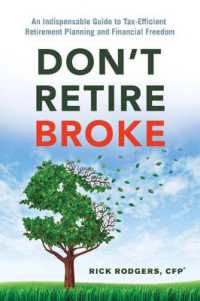- ホーム
- > 洋書
- > 英文書
- > Business / Economics
Full Description
Today's museum educators are tackling urgent social issues, addressing historic inequalities of museum collections, innovating for accessibility, leveraging technology for new in-person and virtual learning experiences, and cultivating partnerships with schools, businesses, elders, scientists, and other social services to build relationships and be of service to their communities. Despite the physical distance the pandemic placed between museums and their visitors, museum educators have remained essential -- sustaining connections with the public through virtual or modified programming, content development, and conversations that they are uniquely qualified to execute. Educators require updated resources to guide their efforts in navigating these new challenges and building upon the opportunities presented by current events and changing audiences.
This book and its accompanying on-line resource share lessons from innovators in the field to support ongoing professional development efforts with essays about current issues. Additionally, it provides new models and tools to guide individual or group reflection on how today's museum educators can adapt and thrive in a dynamic and ever-changing cultural sector. The additional resources include discussion prompts and adaptable templates to allow readers to customize the content based on current events, institutional discipline, size, budget, and staffing scenario of their organization.
The book's essays are divided into three sections:
Changing expectations of visitors - inclusion, participation, and technologyTraining and preparation for responsive, resourceful educatorsModels for the future
While a book can share ideas in the hope of inspiring change, the accompanying online resource (www.EvolveMuseumEd.com) provides a more flexible and responsive forum for sharing ongoing and evolving resources to encourage professional development for museum educators as they respond to the changing needs of today's audiences.
Contents
Table of Contents
Preface
Acknowledgements
Introduction by Dina Bailey
Part I: Changing Expectations of Visitors: Inclusion, Participation, Technology
Building Community and Structural Competency Through Art: An Art Museum and Psychiatry Partnership by Theresa Sotto, Hallie Scott, Enrico CastilloChanging the Educational Landscape: School & Museum Partnerships for the 21st Century by Veronica Alvarez, Sarah Jenks, Catherine Awsumb Nelson, Elisabeth GerberThe Spectrum Project: Social Stories, Museum Educators, and Young Adults with Autism by Beth Redmond-JonesDigital Pivot: Digital Decisions to Accelerate the Momentum Among Art Institutions to Evolve, Change, and Adapt by Mark OstermanPart II: Training and Educator Preparation
Training for the Rainbow: Preparing Educators to be LGBTQ-Inclusive by Mac BuffBuilding a Better World: Rethinking a Museum's Civic Engagement Model by Rachel Stark, Anna SchwarzFacilitating Family Learning in Museums: Re-Thinking our Assumptions and Approaches by Scott Pattison, Smirla Ramos-MontanezMuseum Studies Programs: A Conversation about the Future by Jason Porter, Mary Kay CunninghamCreating Empowered Educators by Lorie MilwardCultivating a New Mindset for Professional Development by Beth MaloneyPart III: New Models, Anticipating the Future
Building Bridges: The Need for Cultural Competence in the Museum Field by Teresa Williams ValenciaThe New Children's Museum: Innovating Ways to Support Today's Children by Tomoko KutaSee the System and Be Problem Specific: Human-Centered Design and Improvement Practices for Engagement and Inclusion by Julie SmithThe brain science of museum learning by Jayatri Das, co-author Mickey MaleyNo Longer Business as Usual: Reconstructing Relevancy through Critical Race Theory by Melanie Adams, Kayleigh Bryant-GreenwellThe Impact of COVID19 on the Field of Museum Education by Juline ChevalierEducators with Lived Experience: Lessons Learned from the Learned by Lauren Zalut, Sean KelleyIndex
About the Editors and Contributors








